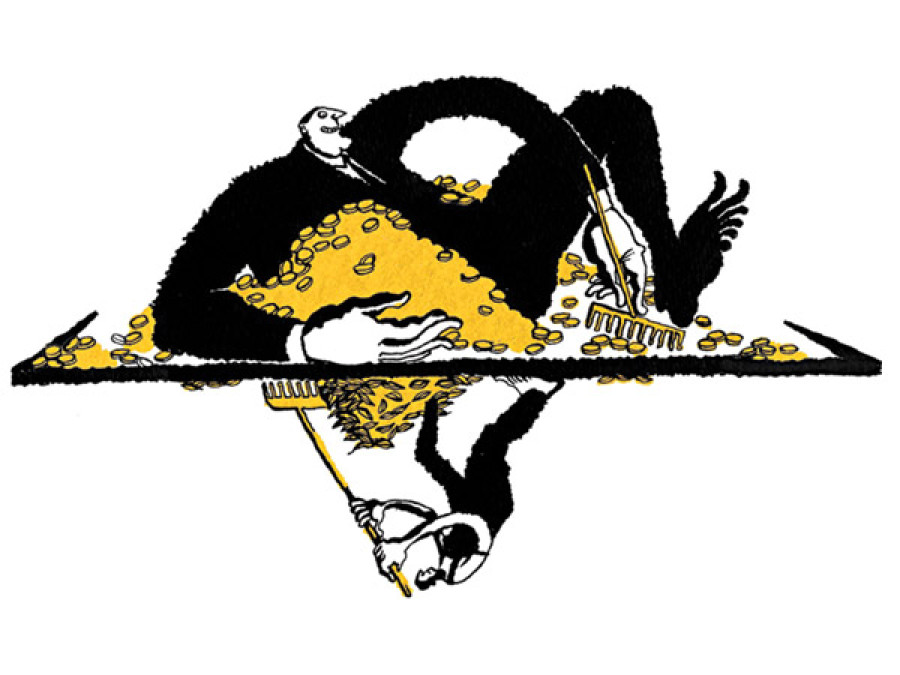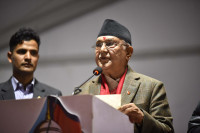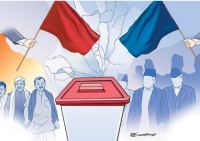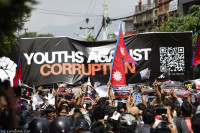Opinion
The roving bandits
When those in power feel their tenure is short, the tendency is to make hay while the sun shines
The average tenure of a prime minister in Nepal has been around a year. As soon as a new government is elected, rumours about its imminent fall and political manoeuvrings to destabilise the government start in earnest
Corruption is assuming an institutional form in Nepal. The recent Indian blockade has led to a thriving black market of petroleum products in the country; it is an open secret that the government has not been taking this issue seriously. What has encouraged this trend is the phenomena of roving banditry that is becoming the hallmark of Nepali political life.
Since 1950 when Nepal started on its path of establishing and institutionalising a democratic system of governance, it is remarkable that no prime minister of the country has had the good fortune to remain in office for a period of five years. The average tenure of a prime minister in Nepal has been around a year. As soon as a new government is elected, rumours about its imminent fall and political manoeuvrings to destabilise the government start in earnest. As for the cabinet ministers who are well aware of the average tenure of the government, they spend their time in office garnering resources for the next election or working on personal financial plans. This creates a situation that could be labelled as roving banditry—a phrase coined by economist Mancur Olson to indicate a destructive type of corruption even when the government claims to be elected by the people.
When those in power feel that their tenure is short, the tendency is to ‘make hay while the sun shines’. This provides an impetus to roving banditry where the person in power is incentivised to divert public resources for private gain as much as possible without worrying about its broader impacts.
The person knows that the opportunity for corruption that is now open before them is not going to last very long—maybe not even a year.
No fear of apprehension
Roving banditry gains momentum when the perpetrators are confident that the probability of a corrupt official being apprehended is low. To ensure that the probability of apprehension remains low, roving bandits, once in power even for a very short time, will try to install their own people in key positions of state. Thus, impunity as a political culture takes root over time. There is a renewed push to politicise the different apparatus of the state so that corruption becomes a low-risk, high-pay business.
It can be argued that a political system based on democratic norms and constitutionalism will be a deterrent to roving banditry. A constitutional system based on checks and balances would make it difficult for a roving bandit mentality to take root, since the institutional structure would not allow it to continue unchallenged. This argument has its merits but the emergence of what Olson describes as a “distributional coalition” in a political system weakens the effectiveness of established political institutions to confront corruption. The normal constitutional mechanism for checks and balances may be established and yet it can remain anaemic because of a distributional coalition that sustains a roving banditry mentality among those in power.
The idea that a distributional coalition sustains roving banditry, especially in countries that have a weak bureaucracy and frequent changes in government, is not very far-fetched. Small vested interest groups and lobbies that are aware of the benefits from their efforts to influence government policies or programmes are far more active than the public at large in spending time and resources to achieve their goals. This is the famous theorem of collective action that Olson brilliantly outlined over fifty years ago. It is this asymmetry in effort that allows the few to benefit at the cost of many. Therefore, the formation of a distributional coalition can go unchecked while the general public remains unaware or unwilling to challenge the loot.
The recent scandal about the pricing of petroleum products by Birat Oil with the support and protection of the Nepal Oil Corporation (NOC) is just one example of the scale and brazenness of the roving banditry in the nation. The Oli-led government had promised to ‘destroy the roots of corruption in the country.’ And yet, Birat Oil was allowed to charge one-third more than the price set by the NOC on the ground that it was approved by the government and that the oil was of Euro 4 standard. We are now told that the quality of the oil was not as claimed and that the government conveniently had no idea what the NOC was doing. Meanwhile, the minister in charge simply refuses to investigate the case. It is to the credit of the Nepali media that it refused to remain silent and exposed the issue. Nevertheless, it seems the ‘distributional coalition’ that exists in the country is tilted against the common man and the government appears helpless against the culprits. Any serious investigation could emerge as a challenge to the structure of the distributional coalition and it is a risk that the government seems to be in no mood to undertake.
Is somebody listening?
A strong distributional coalition among political parties as exists in present day Nepal goes against the very logic of transparency and accountability in governance. Transparency is like an antibiotic against corruption and is feared by lobbies and vested interest groups; it raises the cost of corruption and increases the probability of investigation, which is the first step in apprehension and punishment. A free press is therefore feared by corrupt regimes. The use of different instruments of persuasion and coercion including money, muscle and legal ambiguities can be their distinguishing features, ultimately leading to political instability and state failure.
Despite all the airy rhetoric and commitment to the interest of the toiling masses, lack of transparency is a road that Nepal has not yet abandoned. It is almost certain that the recent loot by Birat Oil and its partners in government will remain shrouded in mystery. Of course, the minister has said that there will be an investigation, but the strength of the distributional coalition determined to plunder state resources will make sure that it leads to nowhere. The question is: Will the prime minister listen? Is he willing to control the elite bandits? The answer is not clear.
Lohani is a senior leader of the Rastriya Prajatantra Party




 10.12°C Kathmandu
10.12°C Kathmandu









